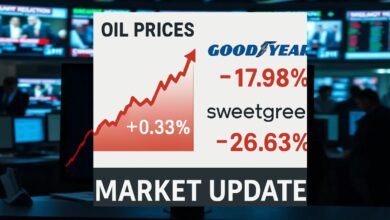Cannabis Stocks Surge as Trump Considers Marijuana Reclassification
Report sparks double-digit gains for major cannabis companies, with industry leaders calling potential Schedule III move a “gamechanger” for the $80 billion U.S. marijuana market.

Cannabis stocks jumped after reports that President Trump is considering moving marijuana from Schedule I to Schedule III, a shift that could reshape the $80 billion U.S. industry and boost investor interest.
Cannabis Stocks Rally as Trump Weighs Marijuana Reclassification
New York — August 11, 2025 — Cannabis stocks soared Monday after a Wall Street Journal report revealed that President Donald Trump is considering reclassifying marijuana to a lower danger level under federal law.
The news sent some of the sector’s biggest names sharply higher:
- Canopy Growth and Tilray Brands each surged over 12%.
- Cronos Group jumped more than 5%, hitting a new 52-week high.
- Cannabis-focused ETFs, including the AdvisorShares Pure U.S. Cannabis ETF (MSOS) and the Amplify Alternative Harvest ETF (MJ), both rallied over 10%.
Many cannabis stocks trade for under $1 per share, meaning even small moves translate into large percentage gains. Still, despite Monday’s rally, most remain far below their pandemic-era peaks.
The Report That Sparked the Rally
Late Friday, The Wall Street Journal cited people familiar with White House discussions saying Trump had raised the idea of reclassifying marijuana during a fundraiser at his New Jersey golf club earlier this month.
Speaking Monday, Trump confirmed that the administration was “looking at reclassification” and would make a determination “over the next few weeks.”
“It’s a very complicated subject,” Trump said at a press conference.
What Reclassification Means
Under the Controlled Substances Act, marijuana is currently a Schedule I drug — the most restrictive category — alongside heroin and cocaine.
A reclassification to Schedule III would place cannabis in the same group as anabolic steroids and Tylenol with codeine.
Key Implications of a Move to Schedule III:
- Tax Relief for Cannabis Businesses — Schedule III status would end the harsh IRS restrictions under Section 280E, which prevent cannabis companies from deducting business expenses.
- Easier Research and Development — Reclassification would loosen federal restrictions on medical and scientific research.
- Boost in Institutional Investment — Pension funds, mutual funds, and other institutional players could enter the market.
- Banking Access — While still technically federally illegal, Schedule III could pave the way for more banks to work with cannabis businesses.
Industry Optimism
Tilray CEO Irwin Simon told CNBC he believes the reclassification process would take about a year but welcomed Trump’s public support.
“Trump gets things done. He wouldn’t be talking about it if he’s not going to get something done,” Simon said.
Tim Seymour, chief investment officer at Seymour Asset Management, called it a “gamechanger” for the $80 billion U.S. marijuana market.
“It does not mean that it won’t be a complicated trade,” Seymour said. “But it does mean that you’re investing now well ahead of a lot of institutional capital if you are, in fact, investing into this sector.”
Political Reality Check
While Trump’s backing is significant, he cannot unilaterally reclassify marijuana. The Attorney General holds the authority under the Controlled Substances Act, typically delegating to the Drug Enforcement Administration (DEA).
Historically, marijuana rescheduling efforts have faced bureaucratic and political delays. Still, bipartisan support for a Schedule III move has grown, especially as more than three dozen states have legalized cannabis for medical or recreational use.
A Market in Transition
The cannabis industry has been in a multi-year slump despite state-level legalization gains. Factors weighing on the market include:
- Lack of federal legalization
- High state and federal taxes
- Oversupply in some regions
- Limited banking services
Monday’s rally reflected renewed optimism that a federal policy shift could spark new capital flows and profitability improvements.
Historical Context: Cannabis Rescheduling Efforts
- 1970 — Marijuana placed in Schedule I under the Controlled Substances Act.
- 2016 — DEA rejects petitions to reschedule cannabis, citing lack of FDA-approved medical use.
- 2022 — President Biden directs federal agencies to review marijuana’s classification.
- 2024 — HHS recommends moving marijuana to Schedule III, but DEA delays action.
- 2025 — Trump signals consideration of reclassification.
Global Perspective on Cannabis Regulation
- Canada — Legalized recreational cannabis nationwide in 2018; major producers like Canopy Growth and Tilray are headquartered there.
- Germany — Recently legalized limited recreational use, creating a regulated market.
- Australia — Expanded medical cannabis program and exploring broader legalization.
- Mexico — Supreme Court has ruled cannabis prohibition unconstitutional, but legislation is pending.
The U.S. shift to Schedule III could align it more closely with other advanced economies in cannabis regulation.
Investment Implications
Short-Term Trading
With many cannabis stocks trading under $1, volatility is amplified. Monday’s double-digit gains may attract momentum traders, but profit-taking could follow.
Long-Term Positioning
Institutional investors have largely stayed out of the sector. A confirmed reclassification could change that, potentially leading to higher valuations.
ETFs and Sector Funds
Funds like MSOS and MJ provide diversified exposure, which may reduce company-specific risk.
Potential Scenarios Moving Forward
- Reclassification to Schedule III in 2026 — Boosts valuations, expands institutional participation, improves profitability.
- Partial Policy Shift — Administrative delays or political opposition slow the process, limiting short-term gains.
- No Federal Action — Market returns to focus on state-level growth and consolidation.
Challenges That Remain
Even with Schedule III status, cannabis would still be federally illegal for recreational use in states that haven’t legalized it. Other hurdles:
- State-by-state patchwork regulations
- Continued stigma in some regions
- Need for federal banking reform for full integration into the financial system
Analyst Takeaways
- Bullish View: Trump’s comments mark a political turning point that could lead to transformative change in the cannabis industry.
- Bearish View: Bureaucratic inertia could stall progress, leaving stocks vulnerable to disappointment.
Conclusion: A Sector at a Crossroads
The cannabis industry’s Monday rally underscores how sensitive the sector is to federal policy signals. While optimism is warranted, history suggests the road to reclassification will be complex and potentially slow.
For investors, the coming weeks — and Trump’s decision timeline — will be critical in determining whether this rally is the start of a long-term revaluation or just a short-lived spike.





